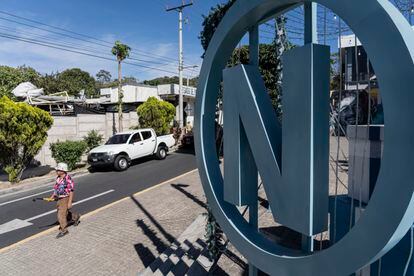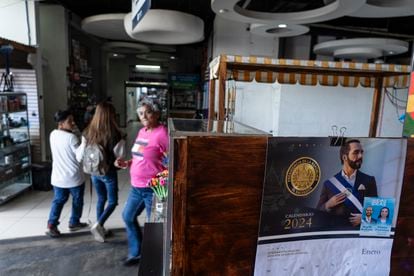There is a place on planet Earth that embodies Nayib Bukele's desires for transcendence like no other. It is called Nuevo Cuscatlán and is located a quarter of an hour by car from San Salvador. Mountainous and with a tropical climate, surrounded by coffee plantations, upon arrival, small tin houses and mansions with swimming pools filled with crystalline water that disappear into the horizon appear through the window.. This can be considered the birthplace of the politician who has amazed the world from El Salvador, a small nation of 6.3 million inhabitants. Bukele was elected mayor of this town in 2012, with a budget of two million dollars, when he had hardly any experience. Until then he had only managed a nightclub, Code, and a Yamaha dealership. Even so, shortly after taking office he was strolling through these streets that he himself paved in a van with tinted windows, surrounded by bodyguards. He was addressing his neighbors, who fit on a double-decker bus, as if he were giving a speech at the UN General Assembly. He talked to them about paradigms and abstract concepts. He sported the self-confidence of those born surrounded by privilege. People were not able to verbalize the spell he felt, they simply watched him fascinated.
Those who know him assure that his arrogance is only compared to his level of ambition. At that time he already had the secret conviction that his destiny was written in golden letters: he was not a simple town mayor, but the next president of the nation. He belonged to the FMLN, the classic party of the Salvadoran left. In fact, he despised it as an outdated structure full of incompetent cadres. In meetings, his colleagues felt a certain discomfort hearing him speak with that millennial ease. “He was a wolf and we were sheep. Only we didn't know it then,” says one of those present at those meetings. Next he made the leap to the mayor of San Salvador and the position, once again, was too small for him. The FMNL told him that he would not be the candidate for the 2019 presidential elections, arguing that he was too young. But Bukele (42 years old) does not have much patience. From that precise moment he began a smear campaign against the party, which had no other option but to expel him. The road to absolute power seemed paved.
Touring Nuevo Cuscatlán it is impossible not to think that everything has been part of a premeditated plan. The N is stamped in every corner of the municipality, which is the first letter of his name, but also that of Bukele. The buildings, the sidewalks, the sidewalks are painted cyan, the color of what is now his party, Nuevas Ideas. The embryo was here, only many did not want to see it. The cult of his person, the feeling of omnipresence, the order and command. That fascination that he now exerts on the rest of the country shines in the eyes of Luis Ponce, 47, a City Hall worker with metal teeth. He says that Bukele was present at one of the key moments in his life, his wedding. He served as master of ceremonies. He put order in this place, he painted the houses in cheerful colors, he went to the celebrations of the humble people to drink atole. When he left, the neighbors cried. Ponce does not care that his son was imprisoned during the time of Bukele, who has filled the prisons with more than 76,000 prisoners to deactivate the gangs. He says that God is perfect, God knows everything and he prefers that his son be “inside rather than outside,” because he was “on the move.” He believes that Bukele, who has almost 90% approval in El Salvador, has divine help: “This president works with the power of God. He is quality of person.”

Bukele is expected to be re-elected president this Sunday with an overwhelming majority. The Salvadoran Constitution prohibited him from running again, but the Constitutional Chamber, made up of judges chosen by him, has given him free rein. Some polls predict that he will exceed 80% of the votes. His personalism has caused the opposition to evaporate. Since he won five years ago he has forged the image of an iron leader. He decreed an emergency regime in force to this day, with which he has fully hit the two main gangs, the Mara Salvatrucha and the Barrio 18. Human rights organizations denounce that along the way he has taken thousands of innocent, to whom due process has not been applied nor are they offered a fair trial. Lawyers cannot contact their clients, held in a mega-prison called the Terrorism Confinement Center. The families do not receive a single call from within.
The country's economy is not doing particularly well, local newspapers document that there are people starving and cooking soups with stubble. But the fact that he has managed, at least momentarily, to make gang members disappear from the daily lives of Salvadorans makes him a tremendously popular leader. Citizens turn a deaf ear to the fact that the international community has shown its concern about what it considers an authoritarian drift. Bukele is one and three in El Salvador. In the arrivals terminal of the country's main airport, the presidential office has been recreated, with portraits on either side of Bukele and the first lady, Gabriela Rodríguez. Passengers take delighted photos. The roads are full of advertising for the president and his candidates for the Legislative Assembly. No sign of the FMLN or Arena, the right-wing party. The outlined beard, the hair pulled back that reveals a pronounced receding hairline, his tough-guy face from an action movie, flood the nation.

The spell did not work with Bertha María Deleón, who led her legal team for four years. The lawyer does not know if it is because of his age—she was three years older than him—but she always saw him as an immature and impulsive man, addicted to the phone and social networks, who could not spend 30 minutes without checking Twitter trends. What was said about him, good and bad. “He was always a very dispersed person in terms of attention. He has a hard time focusing and organizing,” he explains, “but I think he is very skilled because he learns the script they give him and that is what he communicates. He enthralled the young people.” Deleón defended him in three legal proceedings until she became president, in 2019, and in all legal meetings Bukele had a support stick: her brother Karim. She was his campaign manager, the calm, analytical version of him, the one he trusts to make decisions.
Nayib is the fifth son of Armando Bukele, an influential businessman who founded some of the first mosques in Latin America. Of Palestinian origin, Don Armando, as those who cared for him call him, is the great reference for his son, who has gone so far as to exaggerate his achievements to the point of saying that he had a higher IQ than Einstein or that he was nominated for the Nobel Prize. Karim, Ibrajim Antonio and Yusef Alí were also born from his marriage to Olga Marina Ortez. All of them are now part of the president's exclusive circle, closed to only a few, such as some former classmates from the Pan American School or figures like the current president of the Assembly, Ernesto Castro, who have accompanied him since the beginning of his political path. .

Deep down, Bukele has never moved away from the origin. He continues to live in an urbanization that is entangled in one of the hills of Nuevo Cuscatlán, called Los Sueños, now guarded by the Army. He has turned a town that everyone confused with its neighbor, Antiguo Cuscatlán, into a mecca for real estate developers, where youtubers and influencers They can have their mural, in the place of desire of other rich people who want to live near the president who bewitched a country he subjugates. The neighbors know that Bukele leaves his mansion because the streets are blocked and the delegation of trucks and army appears to watch him, but the president He has not done a single campaign event in the last three months. He always said that it was possible to govern from a mobile phone. It helps his followers, who number in the millions, to know that the president will continue in Los Sueños.
Follow all the information from El PAÍS América in Facebook and xor in our weekly newsletter.
#Journey #origins #Bukele #ambition #millennial

